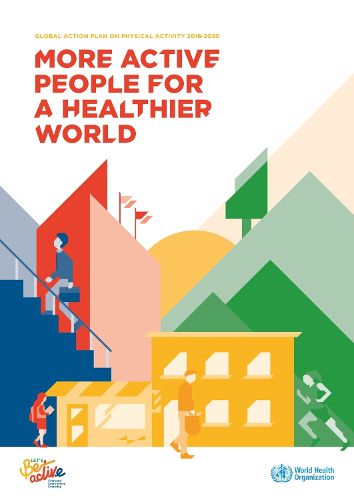Readings Newsletter
Become a Readings Member to make your shopping experience even easier.
Sign in or sign up for free!
You’re not far away from qualifying for FREE standard shipping within Australia
You’ve qualified for FREE standard shipping within Australia
The cart is loading…






Regular physical activity is proven to help prevent and treat noncommunicable diseases (NCDs) such as heart disease, stroke, diabetes and breast and colon cancer. It also helps to prevent hypertension, overweight and obesity and can improve mental health, quality of life and well-being.In addition to the multiple health benefits of physical activity, societies that are more active can generate additional returns on investment including a reduced use of fossil fuels, cleaner air and less congested, safer roads. These outcomes are interconnected with achieving the shared goals, political priorities and ambition of the Sustainable Development Agenda 2030. The new WHO global action plan to promote physical activity responds to the requests by countries for updated guidance, and a framework of effective and feasible policy actions to increase physical activity at all levels. It also responds to requests for global leadership and stronger regional and national coordination, and the need for a whole-of-society response to achieve a paradigm shift in both supporting and valuing all people being regularly active, according to ability and across the life course. The action plan was developed through a worldwide consultation process involving governments and key stakeholders across multiple sectors including health, sports, transport, urban design, civil society, academia and the private sector.
$9.00 standard shipping within Australia
FREE standard shipping within Australia for orders over $100.00
Express & International shipping calculated at checkout
Regular physical activity is proven to help prevent and treat noncommunicable diseases (NCDs) such as heart disease, stroke, diabetes and breast and colon cancer. It also helps to prevent hypertension, overweight and obesity and can improve mental health, quality of life and well-being.In addition to the multiple health benefits of physical activity, societies that are more active can generate additional returns on investment including a reduced use of fossil fuels, cleaner air and less congested, safer roads. These outcomes are interconnected with achieving the shared goals, political priorities and ambition of the Sustainable Development Agenda 2030. The new WHO global action plan to promote physical activity responds to the requests by countries for updated guidance, and a framework of effective and feasible policy actions to increase physical activity at all levels. It also responds to requests for global leadership and stronger regional and national coordination, and the need for a whole-of-society response to achieve a paradigm shift in both supporting and valuing all people being regularly active, according to ability and across the life course. The action plan was developed through a worldwide consultation process involving governments and key stakeholders across multiple sectors including health, sports, transport, urban design, civil society, academia and the private sector.